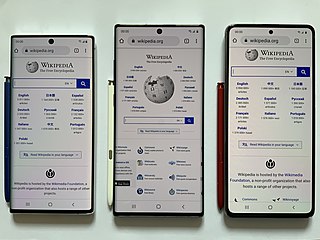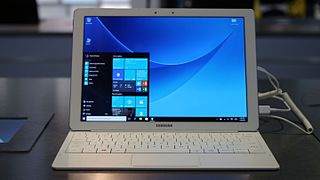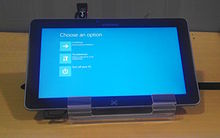
A tablet computer, commonly shortened to tablet, is a mobile device, typically with a mobile operating system and touchscreen display processing circuitry, and a rechargeable battery in a single, thin and flat package. Tablets, being computers, have similar capabilities, but lack some input/output (I/O) abilities that others have. Modern tablets largely resemble modern smartphones, the only differences being that tablets are relatively larger than smartphones, with screens 7 inches (18 cm) or larger, measured diagonally, and may not support access to a cellular network. Unlike laptops, tablets usually run mobile operating systems, alongside smartphones.
A mobile operating system is an operating system used for smartphones, tablets, smartwatches, smartglasses, or other non-laptop personal mobile computing devices. While computers such as typical/mobile laptops are "mobile", the operating systems used on them are generally not considered mobile, as they were originally designed for desktop computers that historically did not have or need specific mobile features. This line distinguishing mobile and other forms has become blurred in recent years, due to the fact that newer devices have become smaller and more mobile unlike hardware of the past. Key notabilities blurring this line are the introduction of tablet computers, light-weight laptops, and the hybridization of the two in 2-in-1 PCs.
This is a list of tablet computers, grouped by intended audience and form factor.

Samsung Galaxy is a series of computing and mobile computing devices that are designed, manufactured and marketed by Samsung Electronics. The product line includes the Samsung Samsung Galaxy S series of high-end phones, Samsung Galaxy Z series of high-end foldables, Samsung Galaxy A series of Mid-range phones, the Samsung Galaxy Book, the Samsung Samsung Galaxy Tab series, the Samsung Galaxy Watch, the Samsung Samsung Galaxy Buds series and the Samsung Samsung Galaxy Fit.
The Omnia series is a line of smartphones produced by Samsung Electronics. Omnia devices run either Microsoft's Windows Mobile 6.5, or Windows Phone 7 operating systems, and one Symbian device under the brand was also released.
The history of tablet computers and the associated special operating software is an example of pen computing technology, and thus the development of tablets has deep historical roots. The first patent for a system that recognized handwritten characters by analyzing the handwriting motion was granted in 1914. The first publicly demonstrated system using a tablet and handwriting recognition instead of a keyboard for working with a modern digital computer dates to 1956.

A 2-in-1 laptop, also known as 2-in-1 PC, 2-in-1 tablet, laplet, tabtop, laptop tablet, or simply 2-in-1, is a portable computer that has features of both tablets and laptops.
Atom is a system on a chip (SoC) platform designed for smartphones and tablet computers, launched by Intel in 2012. It is a continuation of the partnership announced by Intel and Google on September 13, 2011 to provide support for the Android operating system on Intel x86 processors. This range competes with existing SoCs developed for the smartphone and tablet market from companies such as Texas Instruments, Nvidia, Qualcomm and Samsung. Unlike these companies, which use ARM-based CPUs designed from the beginning to consume very low power, Intel has adapted the x86-based Intel Atom line of CPU developed for low power usage in netbooks, to even lower power usage.
The smartphone wars or smartphone patents licensing and litigation refers to commercial struggles among smartphone manufacturers including Sony Mobile, Google, Apple Inc., Samsung, Microsoft, Nokia, Motorola, Huawei, LG Electronics, ZTE and HTC, by patent litigation and other means. The conflict is part of the wider "patent wars" between technology and software corporations.

Windows RT is a mobile operating system developed by Microsoft. It is a version of Windows 8 or Windows 8.1 built for the 32-bit ARM architecture (ARMv7). First unveiled in January 2011 at Consumer Electronics Show, the Windows RT 8 operating system was officially launched alongside Windows 8 on October 26, 2012, with the release of three Windows RT-based devices, including Microsoft's original Surface tablet. Unlike Windows 8, Windows RT is only available as preloaded software on devices specifically designed for the operating system by original equipment manufacturers (OEMs).

A phablet is a mobile device combining or straddling the size formats of smartphones and tablets. The word is a portmanteau of phone and tablet. As of 2020, most budget and entry-level Android smartphones offered in emerging markets can be considered as "phablets", as they have at least a 6.5 inches (165 mm) diagonal screen length and an overall vertical length of at least 6.3 inches (160 mm).

Microsoft Surface is a series of touchscreen-based personal computers, tablets, and interactive whiteboards designed and developed by Microsoft, most of them running the Windows operating system. They are designed to be premium devices that set examples for manufacturers of other Windows-compatible products. It comprises several generations of hybrid tablets, 2-in-1 detachable notebooks, a convertible desktop all-in-one, an interactive whiteboard, and various accessories, many with unique form factors. The majority of devices in the Surface lineup are based on Intel processors and compatible with Windows 10 or Windows 11.

The Samsung Ativ Tab is a 10.1-inch (26 cm) tablet manufactured by Samsung. The Ativ Tab was announced on August 29, 2012 at IFA 2012, incorporates a dual-core 1.2 GHz Qualcomm Snapdragon S4 processor, and runs the Windows RT operating system.

The Samsung Ativ Q was a 13.3-inch convertible laptop to be manufactured by Samsung. Unveiled at a Samsung Premiere event on June 20, 2013, the tablet was to run Windows 8, but also shipped with software that also allowed it to run the Android operating system. The Ativ Q's hardware was also distinguished by multiple folding states and a high resolution display.

The Samsung Ativ Tab 3 is a 10.1-inch (26 cm) tablet manufactured by Samsung. The Ativ Tab 3 was announced on June 20, 2013 at the Samsung Premier 2013 event in London, incorporates a dual-core 1.8 GHz Intel Atom Z2760 processor, and runs the Windows 8 operating system.

The Samsung Ativ Tab 5, previously known as the Samsung Ativ Smart PC, is a 11.6-inch (29 cm) tablet manufactured by Samsung. The Ativ Tab 5 was announced on August 29, 2012 at IFA 2012 in Berlin, incorporates a dual-core 1.8 GHz Intel Atom Z2760 processor, and runs the Windows 8 operating system.

The Samsung Galaxy TabPro S is a 12-inch Windows 10-based 2-in-1 PC produced and marketed by Samsung Electronics. It came in a standard version and a Gold version. The TabPro S marked a departure from the traditionally Android-powered Galaxy lineup and marked the end of the Samsung Ativ brand. Unveiled at Consumer Electronics Show 2016, alongside Samsung Notebook 9, the TabPro S was released on March 18, 2016.

Samsung DeX is a feature included on some high-end Samsung handheld devices that enables users to extend their device into a desktop-like experience by connecting a keyboard, mouse, and monitor. The name "DeX" is a contraction of "Desktop eXperience".
Lists of mobile computers

Samsung Galaxy Book is a line of Microsoft Windows based laptop computers produced by Samsung Electronics of South Korea. The Galaxy Book originated as tablet computers with detachable keyboards, however in 2020 it had evolved into becoming Samsung's main line of laptops, replacing the Samsung Notebook.
















